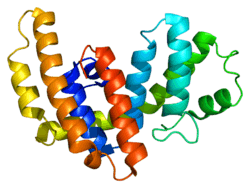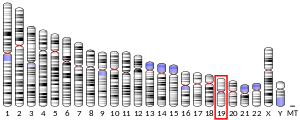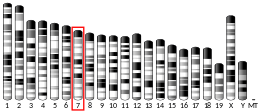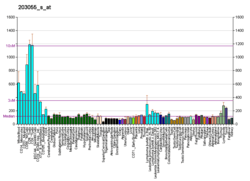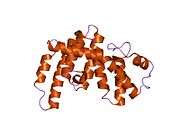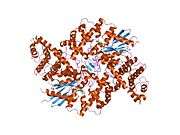ARHGEF1
Rho guanine nucleotide exchange factor 1 is a protein that in humans is encoded by the ARHGEF1 gene.[5][6][7] This protein is also called RhoGEF1 or p115-RhoGEF.
Function
Rho guanine nucleotide exchange factor 1 is guanine nucleotide exchange factor (GEF) for the RhoA small GTPase protein.[8] Rho is a small GTPase protein that is inactive when bound to the guanine nucleotide GDP. But when acted on by Rho GEF proteins such as RhoGEF1, this GDP is released and replaced by GTP, leading to the active state of Rho. In this active, GTP-bound conformation, Rho can bind to and activate specific effector proteins and enzymes to regulate cellular functions.[9] In particular, active Rho is a major regulator of the cell actin cytoskeleton.[9]
RhoGEF1 is a member of a group of four RhoGEF proteins known to be activated by G protein coupled receptors coupled to the G12 and G13 heterotrimeric G proteins.[10][11] The others are ARHGEF11 (also known as PDZ-RhoGEF), ARHGEF12 (also known as LARG) and AKAP13 (also known as ARHGEF13 and Lbc). [12][13] GPCR-regulated RhoGEF1 (and these related GEF proteins) acts as an effector for G12 and G13 G proteins. In addition to being activated by G12 or G13 G proteins, three of these four RhoGEF proteins (ARHGEF1/11/12) also function as RGS family GTPase-activating proteins (GAPs) to increase the rate of GTP hydrolysis of G12/G13 alpha proteins (which are themselves GTPase proteins). This action increases the rate of G protein deactivation, limiting the time during which these RhoGEFs activate Rho.[14]
Multiple alternatively spliced transcript variants have been identified for this gene, but the full-length nature and function of some variants has not been defined.[7]
Interactions
ARHGEF1 has been shown to interact with:
See also
References
- GRCh38: Ensembl release 89: ENSG00000076928 - Ensembl, May 2017
- GRCm38: Ensembl release 89: ENSMUSG00000040940 - Ensembl, May 2017
- "Human PubMed Reference:". National Center for Biotechnology Information, U.S. National Library of Medicine.
- "Mouse PubMed Reference:". National Center for Biotechnology Information, U.S. National Library of Medicine.
- Hart MJ, Sharma S, elMasry N, Qiu RG, McCabe P, Polakis P, Bollag G (October 1996). "Identification of a novel guanine nucleotide exchange factor for the Rho GTPase". The Journal of Biological Chemistry. 271 (41): 25452–8. doi:10.1074/jbc.271.41.25452. PMID 8810315.
- Aasheim HC, Pedeutour F, Smeland EB (April 1997). "Characterization, expression and chromosomal localization of a human gene homologous to the mouse Lsc oncogene, with strongest expression in hematopoetic tissues". Oncogene. 14 (14): 1747–52. doi:10.1038/sj.onc.1200994. PMID 9135076.
- "Entrez Gene: ARHGEF1 Rho guanine nucleotide exchange factor (GEF) 1".
- Hart MJ, Sharma S, elMasry N, Qiu RG, McCabe P, Polakis P, Bollag G (October 1996). "Identification of a novel guanine nucleotide exchange factor for the Rho GTPase". The Journal of Biological Chemistry. 271 (41): 25452–8. doi:10.1074/jbc.271.41.25452. PMID 8810315.
- Thumkeo D, Watanabe S, Narumiya S (Oct–Nov 2013). "Physiological roles of Rho and Rho effectors in mammals". European Journal of Cell Biology. 92 (10–11): 303–15. doi:10.1016/j.ejcb.2013.09.002. PMID 24183240.
- Kozasa T, Jiang X, Hart MJ, Sternweis PM, Singer WD, Gilman AG, et al. (June 1998). "p115 RhoGEF, a GTPase activating protein for Galpha12 and Galpha13". Science. 280 (5372): 2109–11. doi:10.1126/science.280.5372.2109. PMID 9641915.
- Hart MJ, Jiang X, Kozasa T, Roscoe W, Singer WD, Gilman AG, et al. (June 1998). "Direct stimulation of the guanine nucleotide exchange activity of p115 RhoGEF by Galpha13". Science. 280 (5372): 2112–4. doi:10.1126/science.280.5372.2112. PMID 9641916.
- Fukuhara S, Chikumi H, Gutkind JS (March 2001). "RGS-containing RhoGEFs: the missing link between transforming G proteins and Rho?". Oncogene. 20 (13): 1661–8. doi:10.1038/sj.onc.1204182. PMID 11313914.
- Diviani D, Soderling J, Scott JD (November 2001). "AKAP-Lbc anchors protein kinase A and nucleates Galpha 12-selective Rho-mediated stress fiber formation". The Journal of Biological Chemistry. 276 (47): 44247–57. doi:10.1074/jbc.M106629200. PMID 11546812.
- Kozasa T (April 2001). "Regulation of G protein-mediated signal transduction by RGS proteins". Life Sciences. 68 (19–20): 2309–17. doi:10.1016/S0024-3205(01)01020-7. PMID 11358341.
- Johnson EN, Seasholtz TM, Waheed AA, Kreutz B, Suzuki N, Kozasa T, et al. (December 2003). "RGS16 inhibits signalling through the G alpha 13-Rho axis". Nature Cell Biology. 5 (12): 1095–103. doi:10.1038/ncb1065. PMID 14634662.
- Holinstat M, Mehta D, Kozasa T, Minshall RD, Malik AB (August 2003). "Protein kinase Calpha-induced p115RhoGEF phosphorylation signals endothelial cytoskeletal rearrangement". The Journal of Biological Chemistry. 278 (31): 28793–8. doi:10.1074/jbc.M303900200. PMID 12754211.
External links
- Human ARHGEF1 genome location and ARHGEF1 gene details page in the UCSC Genome Browser.
Further reading
- Bhattacharyya R, Wedegaertner PB (May 2000). "Galpha 13 requires palmitoylation for plasma membrane localization, Rho-dependent signaling, and promotion of p115-RhoGEF membrane binding". The Journal of Biological Chemistry. 275 (20): 14992–9. doi:10.1074/jbc.M000415200. PMID 10747909.
- Wells CD, Gutowski S, Bollag G, Sternweis PC (August 2001). "Identification of potential mechanisms for regulation of p115 RhoGEF through analysis of endogenous and mutant forms of the exchange factor". The Journal of Biological Chemistry. 276 (31): 28897–905. doi:10.1074/jbc.M102913200. PMID 11384980.
- Chen Z, Wells CD, Sternweis PC, Sprang SR (September 2001). "Structure of the rgRGS domain of p115RhoGEF". Nature Structural Biology. 8 (9): 805–9. doi:10.1038/nsb0901-805. PMID 11524686.
- Chen Z, Singer WD, Wells CD, Sprang SR, Sternweis PC (March 2003). "Mapping the Galpha13 binding interface of the rgRGS domain of p115RhoGEF". The Journal of Biological Chemistry. 278 (11): 9912–9. doi:10.1074/jbc.M212695200. PMID 12525488.
- Bhattacharyya R, Wedegaertner PB (May 2003). "Characterization of G alpha 13-dependent plasma membrane recruitment of p115RhoGEF". The Biochemical Journal. 371 (Pt 3): 709–20. doi:10.1042/BJ20021897. PMC 1223324. PMID 12534370.
- Bhattacharyya R, Wedegaertner PB (April 2003). "Mutation of an N-terminal acidic-rich region of p115-RhoGEF dissociates alpha13 binding and alpha13-promoted plasma membrane recruitment". FEBS Letters. 540 (1–3): 211–6. doi:10.1016/S0014-5793(03)00267-9. PMID 12681510.
- Bourguignon LY, Singleton PA, Zhu H, Diedrich F (August 2003). "Hyaluronan-mediated CD44 interaction with RhoGEF and Rho kinase promotes Grb2-associated binder-1 phosphorylation and phosphatidylinositol 3-kinase signaling leading to cytokine (macrophage-colony stimulating factor) production and breast tumor progression". The Journal of Biological Chemistry. 278 (32): 29420–34. doi:10.1074/jbc.M301885200. PMID 12748184.
- Holinstat M, Mehta D, Kozasa T, Minshall RD, Malik AB (August 2003). "Protein kinase Calpha-induced p115RhoGEF phosphorylation signals endothelial cytoskeletal rearrangement". The Journal of Biological Chemistry. 278 (31): 28793–8. doi:10.1074/jbc.M303900200. PMID 12754211.
